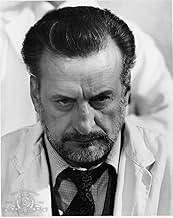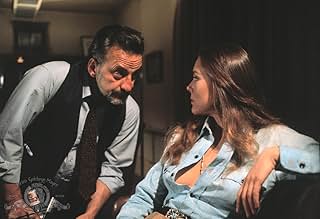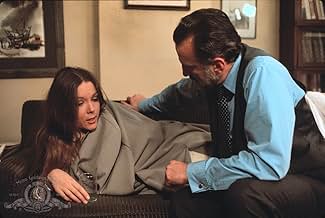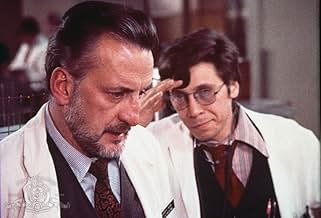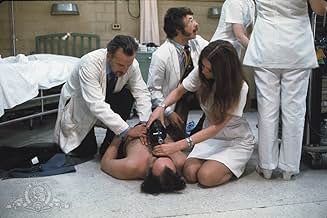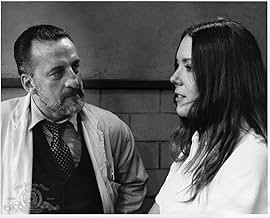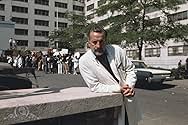IMDb-BEWERTUNG
7,1/10
7846
IHRE BEWERTUNG
Ein überlasteter Arzt kämpft darum, einen Sinn in seinem Leben zu finden, während ein Mörder in den Fluren seines Krankenhauses umherstreift.Ein überlasteter Arzt kämpft darum, einen Sinn in seinem Leben zu finden, während ein Mörder in den Fluren seines Krankenhauses umherstreift.Ein überlasteter Arzt kämpft darum, einen Sinn in seinem Leben zu finden, während ein Mörder in den Fluren seines Krankenhauses umherstreift.
- 1 Oscar gewonnen
- 7 Gewinne & 5 Nominierungen insgesamt
Richard Dysart
- Dr. Welbeck
- (as Richard A. Dysart)
Empfohlene Bewertungen
It's hard to tell in this scenario. We've all heard about (or maybe even experienced) some quirky stuff in hospitals, but this one (fashioned by Paddy Chayefsky) really takes the cake.
Seldom has there been such an odd assortment of patients, staff and docs under one roof. Agreed some reforms are needed in the medical profession which warrant exposing.
But Chayefsky creates a circus, replete with sexually maladjusted interns, an Indian medicine man performing out-patient rites, and a mad killer stalking the corridors for victims and bopping them over the head. That George C. Scott keeps a straight face must be one of the great acting feats of '71.
The script goes so over-the-top that it gives that term a new meaning. Enough to make one want to cancel their Medicare and go alternative all the way.
Where's that grape seed extract and Noni juice?
Seldom has there been such an odd assortment of patients, staff and docs under one roof. Agreed some reforms are needed in the medical profession which warrant exposing.
But Chayefsky creates a circus, replete with sexually maladjusted interns, an Indian medicine man performing out-patient rites, and a mad killer stalking the corridors for victims and bopping them over the head. That George C. Scott keeps a straight face must be one of the great acting feats of '71.
The script goes so over-the-top that it gives that term a new meaning. Enough to make one want to cancel their Medicare and go alternative all the way.
Where's that grape seed extract and Noni juice?
Hospital (1971)
George C. Scott is amazing, just terrific as a struggling, aging, world-weary doctor. A couple of the speeches he gives (from the sharply written screenplay) are first rate quotable stuff. See this movie for him alone.
Overall, this is certainly a New Hollywood movie, straight out of the late 1960s politics and sexual revolution. It's also a bit of a middle-aged male fantasy (the director and writer and main actor being of course all middle aged males). I mean, a key line in the movie is when young and slightly batty Barbara, played by Diana Rigg (Emma Peel in the television series "The Avengers"), says to the very middle aged George C. Scott, "I have a thing for middle aged men." Or something to that effect--and you know what happens next.
But that's the weakest part of the movie. The best part is the hospital scene itself, the chaotic and scary lack of medical professionalism at an under-funded big city medical center. Scott plays the chief of medicine, Dr. Bock, and he gradually sniffs out a truly murderous element to the place, a kind of whodunnit built into this otherwise growing drama of doctors inside and protesters outside (usually) and a general sense that the old order isn't able to keep order against the rising restlessness of young people and their demands.
In a way, the flakiness of Barbara and the rock-steady but yet suicidal authority of Bock are symbolic of the two sides, the two generations, that signified so much back then. Barbara suggests dropping out and turning on, and the doctor grows to the idea. I mean, who wouldn't in his shoes, having Diana Rigg begging you to leave your miserable job and life and moving to the mountains of Mexico to make babies. That's no exaggeration--that's the carrot, and the doctor sees it the way many people saw it then, the escape as a reasonable alternative to a crumbling world.
And yet, the hospital has needs, like dying people, and a group of people displaced from their apartment building next door, and of course this murderer on the loose.
In a way, it's a sloppy, terribly constructed movie. But it has an element of abandonment and realism from the era that really works. If you just go along with the superficial parts of the plot, which are fun, you might just get sucked into the tawdry medical world in 1971 Manhattan.
The writer, by the way, is Paddy Chayefsky, and he won his second Oscar for this screenplay. It was considered that timely and sharp at the time, and there is some terrific writing, some really good dialog to keep it humming. (He did a ton of television, but also next wrote the screenplay for "Network," winning his third Oscar for that.)
The director, Arthur Hiller, moved from 1960s television to movie directing and made a lot of middling fare, though a few became well known such as "Love Story" (1970) and "Man of La Mancha" (1972). The cinematographer Victor J. Kemper is straight out of New Hollywood and his style feels beautifully unpolished and complex (he went on to do a lot of solid movies, some really terrific like "Dog Day Afternoon"), and this helps hold the disparate plot elements together.
George C. Scott is amazing, just terrific as a struggling, aging, world-weary doctor. A couple of the speeches he gives (from the sharply written screenplay) are first rate quotable stuff. See this movie for him alone.
Overall, this is certainly a New Hollywood movie, straight out of the late 1960s politics and sexual revolution. It's also a bit of a middle-aged male fantasy (the director and writer and main actor being of course all middle aged males). I mean, a key line in the movie is when young and slightly batty Barbara, played by Diana Rigg (Emma Peel in the television series "The Avengers"), says to the very middle aged George C. Scott, "I have a thing for middle aged men." Or something to that effect--and you know what happens next.
But that's the weakest part of the movie. The best part is the hospital scene itself, the chaotic and scary lack of medical professionalism at an under-funded big city medical center. Scott plays the chief of medicine, Dr. Bock, and he gradually sniffs out a truly murderous element to the place, a kind of whodunnit built into this otherwise growing drama of doctors inside and protesters outside (usually) and a general sense that the old order isn't able to keep order against the rising restlessness of young people and their demands.
In a way, the flakiness of Barbara and the rock-steady but yet suicidal authority of Bock are symbolic of the two sides, the two generations, that signified so much back then. Barbara suggests dropping out and turning on, and the doctor grows to the idea. I mean, who wouldn't in his shoes, having Diana Rigg begging you to leave your miserable job and life and moving to the mountains of Mexico to make babies. That's no exaggeration--that's the carrot, and the doctor sees it the way many people saw it then, the escape as a reasonable alternative to a crumbling world.
And yet, the hospital has needs, like dying people, and a group of people displaced from their apartment building next door, and of course this murderer on the loose.
In a way, it's a sloppy, terribly constructed movie. But it has an element of abandonment and realism from the era that really works. If you just go along with the superficial parts of the plot, which are fun, you might just get sucked into the tawdry medical world in 1971 Manhattan.
The writer, by the way, is Paddy Chayefsky, and he won his second Oscar for this screenplay. It was considered that timely and sharp at the time, and there is some terrific writing, some really good dialog to keep it humming. (He did a ton of television, but also next wrote the screenplay for "Network," winning his third Oscar for that.)
The director, Arthur Hiller, moved from 1960s television to movie directing and made a lot of middling fare, though a few became well known such as "Love Story" (1970) and "Man of La Mancha" (1972). The cinematographer Victor J. Kemper is straight out of New Hollywood and his style feels beautifully unpolished and complex (he went on to do a lot of solid movies, some really terrific like "Dog Day Afternoon"), and this helps hold the disparate plot elements together.
I had never paid much attention to this flick until I learned that Paddy Chayefsky - author of the brilliant "Network" - was the scriptwriter. His work there had instructed me as to his genius, so when 'Hospital' appeared on TMC, I was anxious to see it. I was not disappointed. Looking at both this film and "Network" it would seem that his big theme is the absurdity, inanity, and sheer viciousness of large human enterprises (e.g., hospitals, networks) against the sanctity of individual experience and the human spirit, and all of it delivered with a knife-edge sense of utterly black humor. "Hospital" is as black of a comedy as "Network" is, and the excellent cast, led by the incomparable Scott, does his work full justice. This is a keeper; definitely not to miss.
Leave it to Paddy Chayefsky to write a ten-minute scene where two characters each speak an expositional monologue that doesn't drag, feel out of place, or spoil the pacing. This film is the definition of a black comedy. George C. Scott and Diana Rigg give terrific performances.
A hospital chief deals with a crisis while battling his own demons. This satire exaggerates situations to drive home its points, but it's a worthwhile black comedy. As with most of his films, Cheyefsky seems more interested in hitting his targets and pontificating than in telling a good story. The Scott character is similar to the William Holden character in "Network," a man with a failing marriage and suffering from menopause who has a chance to rekindle his manhood with a younger woman. Scott is quite good in conveying the middle-aged weariness and bitterness. Rigg is also fine as a hippie, but their instant love affair is not believable.
Wusstest du schon
- WissenswertesWhen Dr. Herbert Bock rants, "We have established the most enormous, medical...entity ever conceived and people are sicker than ever!" the slight pause, searching for the word "entity", was spontaneously ad-libbed by George C. Scott to save the take. The scripted line was, "we have ASSEMBLED the most enormous medical ESTABLISHMENT ever conceived." Scott heard his slip in mid-sentence, so he reworded the line so as to not make it repetitive. Director Arthur Hiller loved the save so much he used that take in the movie.
- PatzerBarbara Drummond says that she lived for a year with the Hopi Indians, but she mispronounces "Hopi" as "Ho-pye."
- Zitate
Herbert Bock: I mean, where do you train your nurses, Mrs. Christie--Dachau?
- Crazy CreditsAlthough Barnard Hughes played two distinct roles, the end credits lists Hughes as playing the role of Drummond but not Dr. Mallory.
- VerbindungenFeatured in Best! Movies! Ever!: Hospitals (2007)
Top-Auswahl
Melde dich zum Bewerten an und greife auf die Watchlist für personalisierte Empfehlungen zu.
- How long is The Hospital?Powered by Alexa
Details
- Erscheinungsdatum
- Herkunftsland
- Sprache
- Auch bekannt als
- The Hospital
- Drehorte
- Produktionsfirma
- Weitere beteiligte Unternehmen bei IMDbPro anzeigen
Box Office
- Bruttoertrag in den USA und Kanada
- 19.711.560 $
Zu dieser Seite beitragen
Bearbeitung vorschlagen oder fehlenden Inhalt hinzufügen



